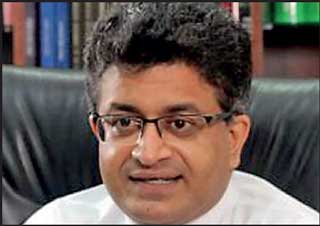Monday Feb 23, 2026
Monday Feb 23, 2026
Tuesday, 7 May 2024 00:26 - - {{hitsCtrl.values.hits}}
 |
| PHU leader Udaya Gammanpila |
Pivithuru Hela Urumaya (PHU) leader Udaya Gammanpila yesterday demanded the resignation of the Central Bank Governor Dr. Nandalal Weerasi-nghe and the Board of Governors yesterday over their decision to hike CBSL employee salaries despite recording a loss of Rs. 114 billion in 2023.
At a press conference in Colombo, Gammanpila highlighted that the Central Bank of Sri Lanka (CBSL) incurred a net loss of Rs. 114 billion in 2023, following a staggering net loss of Rs. 374 billion in 2022.
He pointed out that in typical circumstances when an organisation faces continuous losses, employee benefits such as bonuses and salary increments are often curtailed. However, the MP said despite these substantial losses over the years, the CBSL managed to secure a historic salary increase for its employees, a move that raised eyebrows and drew criticism.
“Even if the Central Bank of Sri Lanka had made a profit, it would still be holding public funds,” he noted.
“The primary method through which the Central Bank generates profit is by lending money to both the Government and banks, thereby accruing interest income. This ability to provide loans stems from the Central Bank’s exclusive authority to print money. Additionally, the profits derived from managing the Government’s official foreign exchange reserves also contribute to the Central Bank’s income. Essentially, it means that public funds are held within the central bank,” he explained.
The MP said therefore both the Governor of the Central Bank and the Board of Governors should tender their resignations without delay. He accused them of misleading the nation by granting salary hikes while incurring losses, all while falsely asserting that they do not rely on public funds.